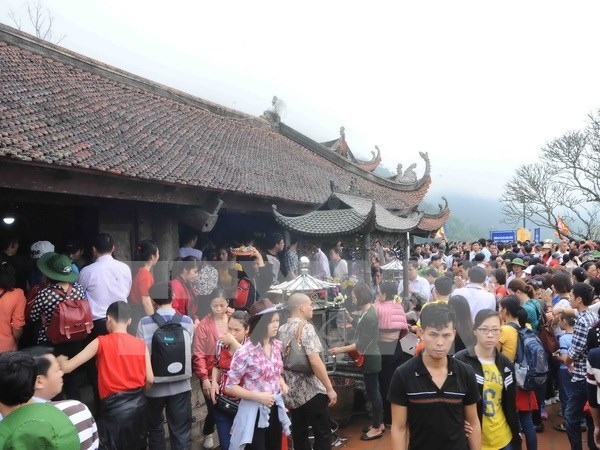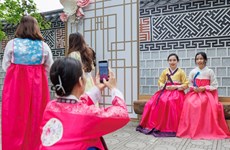Bac Giang proposes combination of Yen Tu’s east, west festivals
Holding the Yen Tu festival in Tay Yen Tu in northern Bac Giang province and Dong Yen Tu in neighbouring Quang Ninh province will help preserve and promote the cultural values of Yen Tu, said a Government Committee for Religious Affairs official.
 A large number of visitors join annual Yen Tu festival (Photo: VNA)
A large number of visitors join annual Yen Tu festival (Photo: VNA)Both Tay Yen Tu (west of Yen Tu) and Dong Yen Tu (east of Yen Tu) festivals have close relations with Truc Lam Zen Buddhism and should be combined, said Bui Huu Duoc, head of the committee’s Buddhism Department at a conference in Bac Giang on December 4.
Prof. Dr. Tram Lam Bien said that the combination of the two festivals will form a great festival to attract Buddhists. He suggested the festival be held in early 2017.
However, Prof. Dr. Chu Van Tuan from the Religion Research Institute said that the combined festival should be postponed to 2018 as currently, Bac Giang has yet to finish preparations and transportation system for the event.
He also proposed that Bac Giang clarify the value of Tay Yen Tu relic and the religious value of the festival to promote the relic site and connect it with regional tours.
Meanwhile, Dr. Pham Hong Trung from the Institute for the Vietnam Studies and Development Science said that it is necessary to follow locals’ wishes in organising the festival, while calling for their engagement in the preservation and promotion of the festival.
In the 13th century, King-Monk Tran Nhan Tong (1258-1308), the third king of the Tran dynasty (1225-1400), abdicated the throne when he was 35 and spent the rest of his life on Yen Tu Mountain, practising Buddhism.
At the end of the Ly dynasty (1009-1225) and the beginning of the Tran dynasty, Yen Tu was a Buddhist worship venue for many monks like Hien Quang, Vien Chung, Dai Dang, Tieu Dao and Hue Tue.
When Tran Nhan Tong practised Buddhism on the mountain, he founded the first Vietnamese School of Buddhism called “Thien Tong,” Vietnam Zen Buddhism, turning the site into the capital of Vietnamese Buddhism.
During the past nearly 1,000 years, hundreds of pagodas and shrines have been built throughout the Yen Tu complex, including structures which boast thousands of prized statues and artefacts.
Yen Tu is also a museum of architecture and diverse fauna and flora. It has favourable conditions for research in history, spiritual culture, tourism potential, ecological environment, bio diversity and gene protection.-VNA













